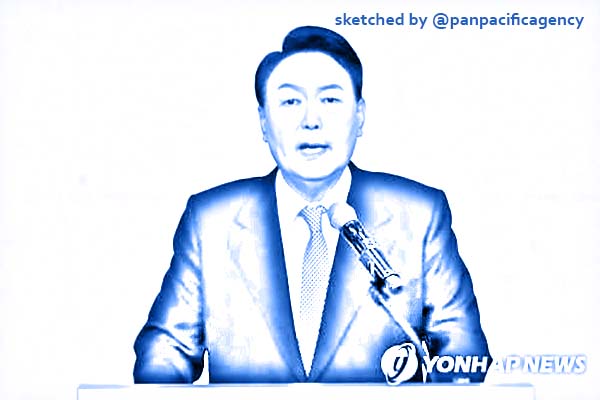S. Korea president-elect pledges ‘private sector-led’ growth

President-elect Yoon Suk-yeol gives a speech at the National Assembly on March 10, 2022. (Pool photo) (Yonhap). Sketched by the Pan Pacific Agency.
SEOUL, Mar 10, 2022, Bloomberg. South Korea President-elect Yoon Suk-yeol pledged after his narrow election victory to support a “private sector-led” economy, outlining a right-leaning agenda that included a sterner response to provocations from North Korea, Bloomberg reported.
The prosecutor-turned-politician vowed to boost growth and create jobs in Asia’s fourth-largest economy, where rising home prices and a widening wealth gap have fueled voter discontent. Yoon’s private-sector approach contrasted with his opponent, former Gyeonggi Governor Lee Jae-myung, who had sought to make South Korea the region’s first nation to pay a universal basic income.
“I will create jobs and strengthen our middle class by shifting the focus of our economy toward the private sector rather than leaving it led by the government,” Yoon, 61, told a briefing Thursday in Seoul after the result.
Yoon secured 48.6% of the vote in the election, compared with Lee’s 47.8%, the country’s closest presidential contest ever. The won advanced the most in more than a year in the wake of his election, while the Kospi followed other indexes up about 2%.
Investors see Yoon as more market-friendly than his progressive former boss, outgoing President Moon Jae-in, and less likely to interfere with business after he takes office on May 10. The new president faced daunting political challenges, with Moon’s Democratic Party holding a supermajority in parliament until at least the next elections in 2024.
Housing prices have doubled in urban centers such as Seoul during the Moon’s term, while wages have failed to keep pace. That has made home ownership unaffordable for many families over the long term, while inflation unexpectedly accelerated in February. Russia’s invasion of Ukraine suggests there will be little respite for rising prices soon.
On the campaign trail, Yoon promised to narrow income disparity and implement a 100-day emergency rescue plan for a Covid-hit economy that would provide a quick and hefty financial injection. He also stoked divisions by pledging to shut down the Gender Equality Ministry — despite South Korea having one of the largest gender-based pay gaps in the developed world.
Nuclear energy, internet and construction stocks were among the biggest winners after his victory Thursday. The so-called peace stocks that typically benefit from improved ties between North and South Korea were the biggest losers.
U.S. President Joe Biden was the first world leader to congratulate Yoon, pledging to cooperate on the pandemic, supply chains and the threats posed by North Korea’s missile and nuclear programs. In his briefing, Yoon reaffirmed the tougher stance toward China and North Korea that he had promised during the campaign.
“We will sternly respond to North Korea’s illegal and unreasonable behaviors based on principles, but we will always keep our doors open for dialogue,” Yoon said. South Korea would be “reborn” as a “pivotal country that contributes to freedom, peace and prosperity,” he said.
During the campaign, Yoon said he would back a preemptive strike if Pyongyang posed an immediate threat and called for a new deployment of a U.S.-made missile interceptor system known as THAAD. China previously banned sales of group tour packages and appearances of Korean celebrities on television shows in retaliation for Seoul’s deployment of the U.S.-led missile shield system.
Moon had made improving ties with North Korea a central focus of his presidency, sometimes prompting friction with Washington. He saw relations sour with Tokyo, while courting Beijing’s support.
Yoon resigned as prosecutor general last year after a falling out over investigations into the president’s associates. The conservative People Power Party recruited him to run as its standard-bearer in part to clean up its image after the impeachment, ouster and conviction of former conservative president Park Geun-hye five years ago.
Yoon signaled an interest in repairing relations with Tokyo, after a bitter trade war in 2019, fueled by disputes over Japan’s 1910-1945 colonial occupation of the Korean Peninsula.
“It is of both ROK and Japan’s interest to focus on the future rather than the past,” Yoon said, referring to the Republic of Korea’s formal name. “I will consider the future of Korea-Japan relationship by having a forward-looking perspective for our youth and future generation.”